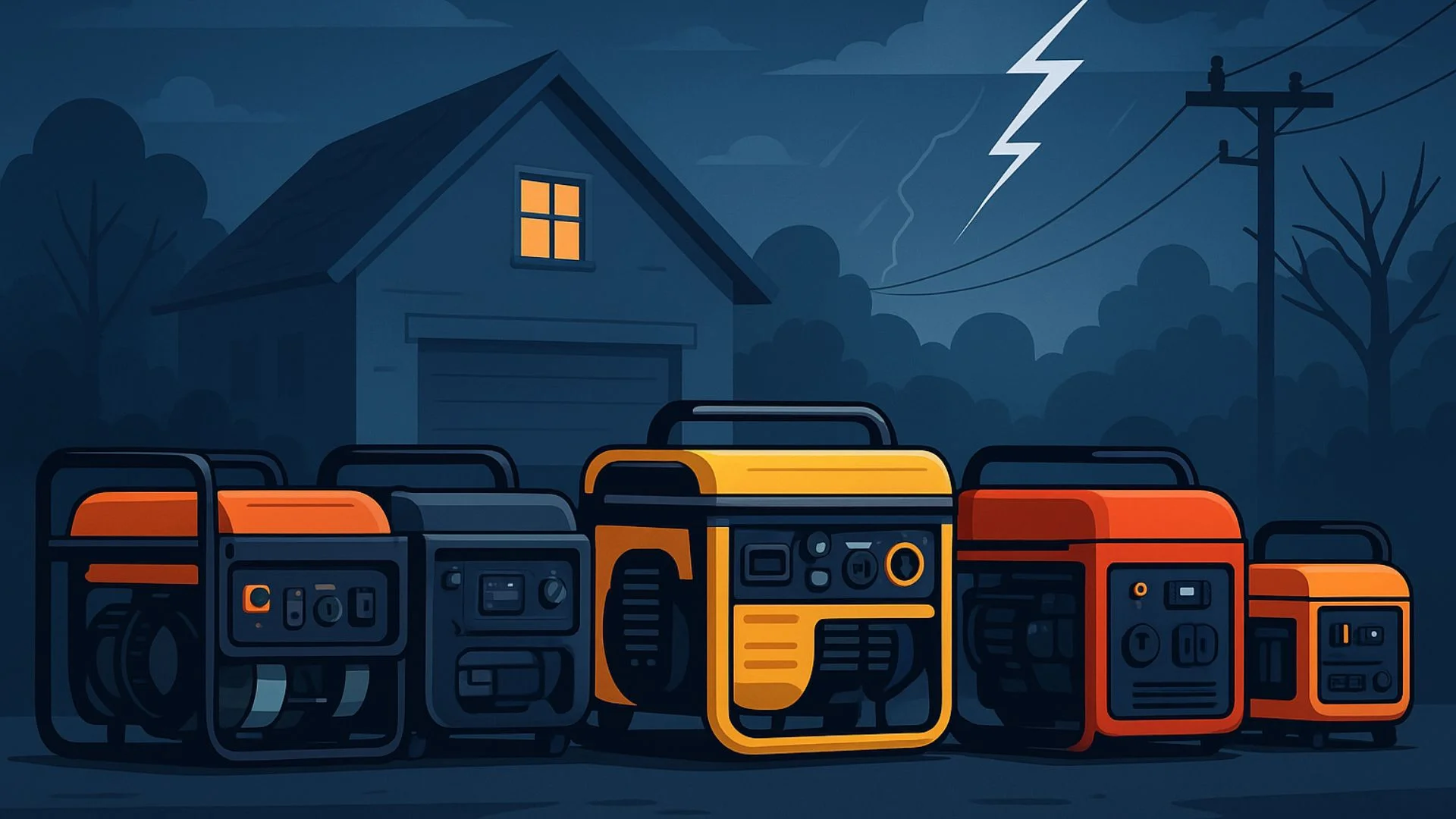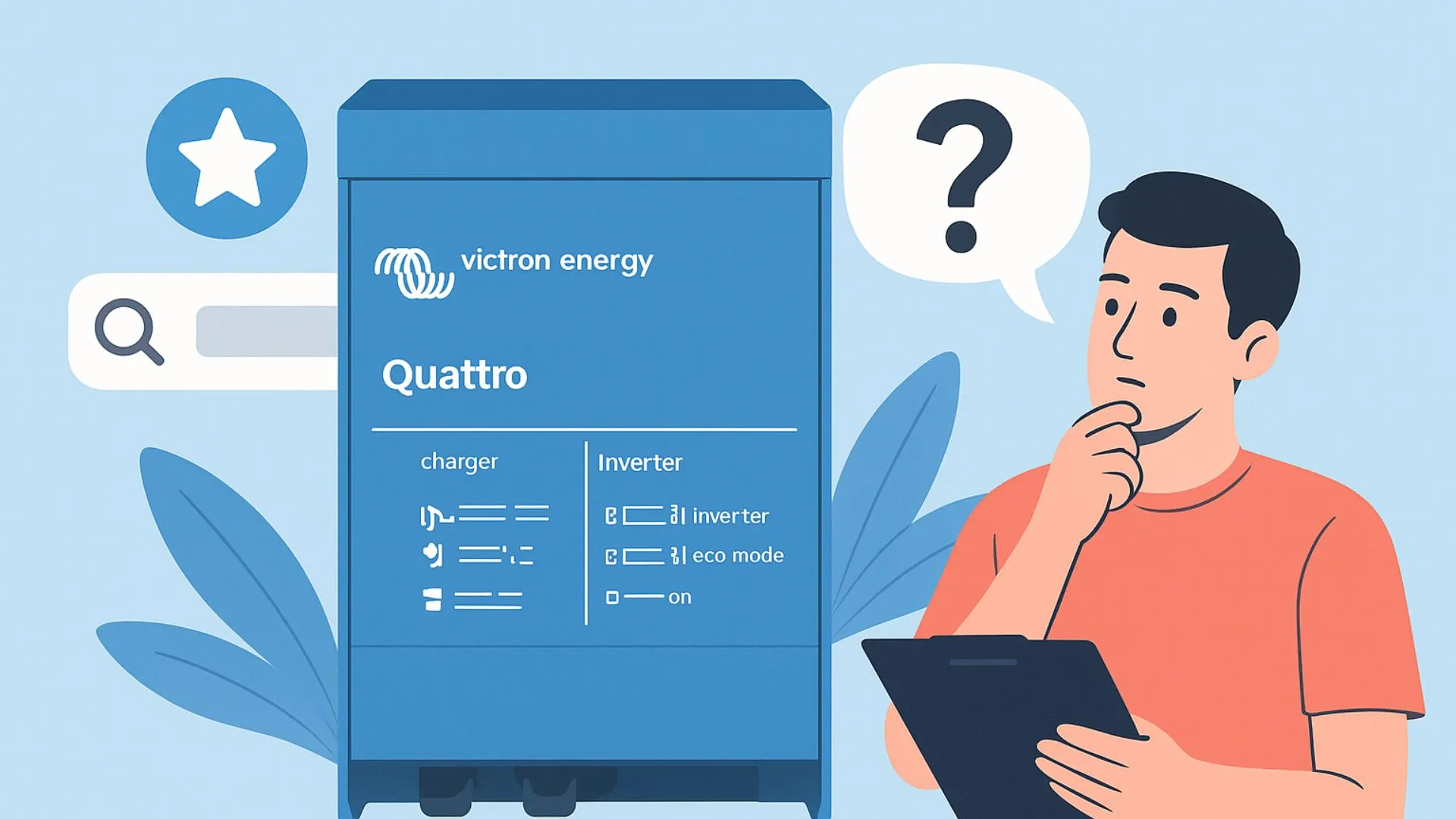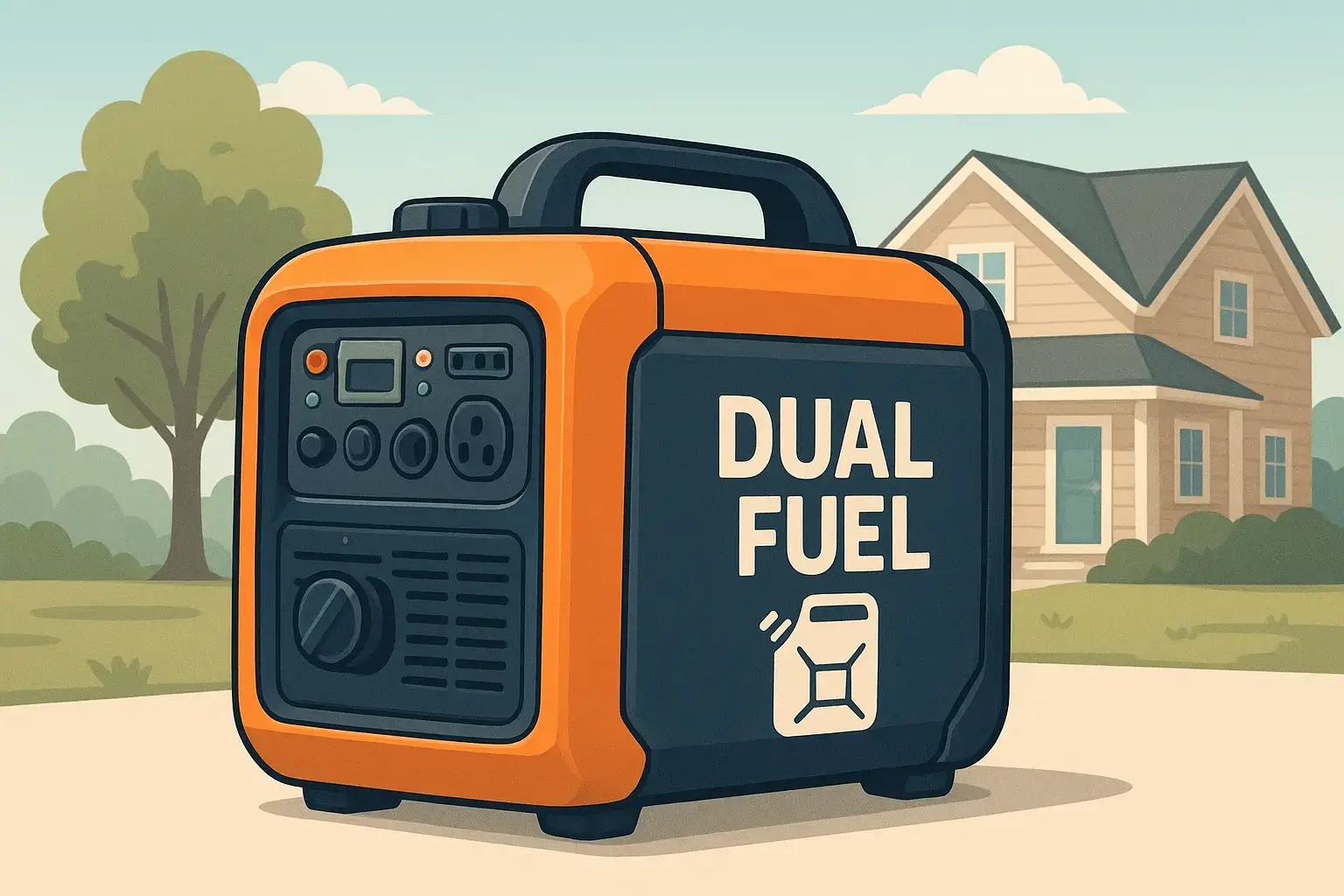⚠️ When shopping for home generators and power backups, we strongly recommend checking out Amazon's daily deals for potential savings. These promotions often change, so reviewing them before purchasing can help you find the best price on the right model. Make sure you don't miss out!
📌 This post may contain affiliate links, so we may receive compensation if you purchase products linked to below. As an Amazon Associate, I earn from qualifying purchases. This helps support our work and allows us to create more helpful content for you at no additional cost to you. Read our disclosure for more information.
Introduction 📜
Looking for the best home generator for power outages in 2025? With climate change, grid instability, and a rise in extreme weather events, the demand for reliable backup power is at an all-time high. Whether it’s a portable generator for emergencies or a whole-house system for long-term resilience, having a dependable power source is no longer optional—it’s essential. In this guide, we review the top home generators of 2025 to help you find the best match for your needs.
Enphase IQ PowerPack 1500 – Advanced Portable Power Station
Pros
✓ Clean & Silent Power: Lithium iron phosphate (LFP) battery with microinverter technology ensures quiet, emission-free backup power.
✓ Smart Connectivity: 4G cellular and Wi-Fi for remote monitoring and control via mobile app.
✓ Portable & Compact: Easy to move and ideal for home backup, camping, or emergency use.
✓ Solar Compatible: Supports solar charging for sustainable energy use.
Cons
✗ Limited Runtime: 1500Wh capacity may not power larger homes for extended outages.
✗ Higher Price Point: More expensive than traditional gas generators with similar output.
Our Choice ⚡ Enphase IQ PowerPack 1500 — Advanced Portable Power Station
The Enphase IQ PowerPack 1500 stands out as a clean, silent, and smart solution for home backup power. Its lithium iron phosphate battery and microinverter technology deliver quiet, emission-free energy, making it ideal for residential use. With built-in 4G and Wi-Fi connectivity, you can monitor and control your power supply remotely. While it has a more limited runtime and higher price compared to traditional gas generators, its portability and solar compatibility make it a forward-thinking choice for reliable and sustainable backup power.
1. What to Look for in the Best Home Generator for Power Outages in 2025
When choosing the best home generator for power outages in 2025, it’s essential to consider several key factors to ensure reliable, efficient, and safe emergency power backup. Whether you want a portable generator for power outages or a whole-house backup generator, understanding these features will help you select the ideal system for your home energy needs.
🔋 1.1 Power Output (Wattage) for Home Backup Generators
The wattage or power output is the most critical spec when shopping for a home backup generator. Calculate your essential appliances’ combined wattage to find a generator that can handle your household’s peak power needs during outages. From small portable inverter generators perfect for basics to powerful whole-house generators that keep your entire home running, wattage determines the scale of protection.
⛽ 1.2 Fuel Type: Gas, Propane, Dual-Fuel & Solar Backup Generators
Fuel type directly impacts runtime, cost, and convenience. Popular choices include gas-powered home generators, propane backup generators, and increasingly, dual-fuel generators that offer fuel flexibility during emergencies. Solar-compatible generators are gaining traction for sustainable off-grid power, especially in 2025’s eco-conscious market.
🔄 1.3 Runtime & Refueling for Extended Power Outages
Long runtime and easy refueling are essential for any emergency power backup system. Look for generators offering fuel efficiency and extended continuous operation so you’re covered during prolonged grid failures. Some advanced models feature automatic refueling or compatibility with transfer switches for seamless power supply.
🔇 1.4 Noise Levels: Quiet Portable Generators for Home Use
Noise pollution can be a dealbreaker, especially for residential areas. The best quiet portable generators and inverter models minimize sound without sacrificing power. Check decibel ratings and look for soundproof housing to ensure your backup power solution keeps your home running discreetly during outages.
💻 1.5 Transfer Switch Compatibility & Safe Home Integration
A compatible transfer switch is crucial for safely connecting your home generator for power outages to your electrical system. This feature ensures smooth, automatic switching during outages, protects utility workers, and prevents backfeed hazards. Always check generator compatibility with your home’s existing transfer switch or plan for professional installation.
🛠️ 1.6 Portability vs. Standby Installation: Choosing Your Generator Type
Deciding between a portable generator or a permanently installed standby home generator depends on your lifestyle and power needs. Portable units offer flexibility and are ideal for occasional outages or camping, while standby generators provide automatic, whole-home power backup with minimal user intervention.
Key Considerations When Choosing a Home Generator
| Consideration | Why It Matters |
|---|---|
| Power Output (Wattage) | Ensures the generator can handle your essential appliances during outages. |
| Fuel Type | Impacts runtime, availability, cost, and environmental footprint. |
| Runtime & Refueling | Determines how long the generator can run continuously without interruption. |
| Noise Level | Important for comfort and compliance with local noise regulations. |
| Transfer Switch Compatibility | Enables safe, automatic switching between utility and generator power. |
| Portability vs Standby | Choose based on whether you want a flexible or permanent power solution. |
🏆 2. Top 5 Generators for Home Power Outages in 2025
Looking for a reliable backup power solution? You’re in the right place. Below is our expert-curated list of the best home generators for power outages in 2025 — handpicked to cover a range of needs, from whole-house systems to portable, quiet, and solar-powered options.
When selecting a generator, two key factors stand out: fuel type and wattage capacity. Whether you’re powering high-demand appliances like air conditioners or just essential circuits, these specs make all the difference in how your generator performs during an outage.
Some models listed below come in different variants, offering higher wattage or dual-fuel capability to suit homes with heavier energy demands or users who want greater fuel flexibility.
And if you’re looking for something compact for outdoor adventures or emergency-only use, you’ll also find a lightweight generator perfect for camping, RVs, or recreational backup.
Let’s dive into the top-rated generators to help keep your home running — no matter the situation.
| Generator Model | Wattage (Running / Peak) | Fuel Type | Runtime (50% Load) | Weight | Noise Level (dBA) |
|---|---|---|---|---|---|
| 1. Westinghouse 12500 Tri-Fuel | 12,500 W Peak | Gas, Propane, Dual-Fuel | Up to 14 hrs | ~196 lbs | ~74 dBA |
| 2. Honda EU2200i Portable Inverter | 1,800 W Running / 2,200 W Peak | Gasoline | 4 - 9.6 hrs | 47 lbs | 48 - 57 dBA |
| 3. ATGIH Camping Portable Power Station | Not traditional generator (Battery power) | Battery / Solar Recharge | Recharge time varies | Lightweight / Portable | Silent |
| 4. Amerisun 2500 Watt Inverter | 1,900 W Running / 2,500 W Peak | Gasoline | Up to 5.5 hrs | 39.7 lbs | 59 dBA |
| 5. Generac 10,000/8,000-Watt Gas Generator | 8,000 W Running / 10,000 W Peak | Gasoline | Up to 11 hrs | 214 lbs | Loud (varies) |
1. Westinghouse 12500 Tri-Fuel Generator Ad
Pros
✓ Versatile: Versatile fuel options
✓ High Power: High power output
✓ Reliable: Great for extended outages
Cons
✗ Price: Higher price compared to some competitors
✗ Heavy: Heavier and less portable
2. Honda 664240 EU2200i 2200 Watt Portable Inverter Generator
Pros
✓ Quiet operation: Extremely quiet operation, suitable for noise-sensitive environments
✓ Fuel-efficient: Fuel-efficient with long runtime (4 to 9.6 hours per tank)
✓ Reliable and solid built: Reliable build quality with safety features like CO-Minder
Cons
✗ Price: Higher price compared to some competitors
✗ Power: Not powerful enough for whole-house backup needs
3. ATGIH - Camping Portable Power Station
Pros
✓ High capacity and fast charging: Powers multiple devices quickly with 62,000mAh and 100W USB-C PD ports.
✓ Portable and durable design: Compact, sturdy, and easy to carry with military-grade build.
✓ Detachable magnetic light and smart display: Useful built-in lamp and real-time charging info enhance usability.
Cons
✗ Charger not included: Requires a separate ≥60W USB-C charger for fast charging.
✗ Display can be glitchy: Occasionally slow or inaccurate battery readings reported.
4. Amerisun - 2500 Watt Portable Inverter Generator
Pros
✓ Ultra-Quiet Operation: At just 59 dBA, it's ideal for camping or home use without disturbing the peace.
✓ Lightweight & Portable: Weighs only 39.7 lbs, with a built-in handle for easy carrying.
✓ Clean, Safe Power: Inverter tech and low THD (below 3%) make it safe for laptops, phones, and other sensitive devices.
Cons
✗ Limited Wattage 2500W surge / 1900W running isn’t enough for large appliances or whole-home backup.
✗ Short Runtime for Larger Loads: Up to 5.5 hours at 50% load may require refueling during longer outages.
5. Generac 10,000/8,000-Watt Portable Gas Generator
Pros
✓ High Starting Capacity: With PowerRush™ Advanced Technology, it delivers up to 40% more starting power, great for running large appliances and tools.
✓ Long Runtime & Fuel Efficiency: Up to 11 hours of runtime at 50% load thanks to its large steel tank and efficient OHV engine.
✓ Electric Start & COsense Safety: Easy electric start with included battery, plus carbon monoxide detection for added safety.
Cons
✗ Noise Level: While powerful, multiple users report it’s relatively loud during operation.
✗ Occasional QC Issues: Some customers received units with missing parts or required minor adjustments (e.g. spark plug gap, carburetor issues).
Closing Thoughts 💭
Choosing the best home generator for power outages in 2025 requires balancing power output, reliability, and ease of use to ensure your household stays safe and comfortable during emergencies. Whether you prefer a heavy-duty gasoline generator, a quiet and fuel-efficient inverter model, or an eco-friendly solar-powered backup, selecting the right home generator is key to maintaining uninterrupted power.
Modern generators come equipped with advanced features such as remote start, tri-fuel or dual-fuel options, and smart transfer switch compatibility — offering not just power, but enhanced convenience and resilience for today’s unpredictable energy demands.
To make the best choice, carefully evaluate your home’s size, energy requirements, budget, and preferred fuel type. Investing in a reliable, top-rated generator from trusted brands like Westinghouse, Generac, and Honda guarantees dependable performance and excellent long-term value.
For those considering solar options as part of their home backup system, understanding how to manage your battery efficiently is crucial — check out our detailed guide on the best solar charge controllers for lithium batteries to ensure optimal performance and longevity.
Don’t wait for the next outage to disrupt your life — equip your home now with a generator that fits your needs and protects your family through 2025 and beyond.
FAQs❓
1. What Are the Benefits of a Whole Home Generator?
+Whole home generators provide seamless, automatic backup power for your entire house during outages, ensuring all essential appliances and systems remain operational for safety, comfort, and convenience.
2. Why Do I Need a Generator for My Home?
+A home generator protects your household from unexpected power outages by keeping lights, refrigerators, HVAC, and critical devices running, preventing food spoilage, damage, and safety risks.
3. How Do Generators Work in a Power Outage?
+Generators detect loss of grid power and automatically start generating electricity using fuel like gas or propane, supplying power to your home via a transfer switch until utility power is restored.
4. Why Choose an Emergency Generator?
+Emergency generators provide reliable, immediate backup power during outages, ensuring your home stays safe, powered, and comfortable during natural disasters or grid failures.
5. Where Do You Place a Home Generator?
+Home generators must be installed outdoors on a stable, level surface, away from doors, windows, and vents to prevent carbon monoxide hazards and allow proper ventilation.
6. Where Should I Keep a Power Generator?
+Portable generators should be stored in a dry, ventilated area when not in use and operated outside, at least 20 feet away from your home for safety.
7. Do Home Generators Have to Be Outside?
+Yes. For safety reasons, home generators must be installed outdoors to prevent dangerous carbon monoxide buildup inside living spaces.
8. How Do Generators Work If There Is No Power?
+Generators produce electricity independently by converting fuel (gas, propane, diesel) into electrical energy, supplying power when the grid is down.
9. How Does a Home Generator Work?
+A home generator runs on fuel to power an engine that spins a generator head, producing electricity that is fed into your home’s electrical system through a transfer switch.
10. How Useful Are Generators?
+Generators are highly useful, ensuring continuous power during outages, protecting food, medical devices, security systems, and maintaining home comfort.
11. What Year Did Generators Come Out?
+The first practical electrical generator was invented in the 1830s by Michael Faraday, laying the foundation for modern power generation.
12. What Kind of Generator Is Best for Power Outages?
+Portable inverter generators are ideal for small loads and quiet operation, while standby whole home generators are best for full-house power backup during extended outages.
13. What Type of Generator Is Used for Residential Power Supply?
+Residential backup power typically uses natural gas, propane, or diesel-powered standby generators designed to automatically power your home when the grid fails.
14. How Do I Choose an Emergency Generator for My House?
+Choose a generator based on your home's wattage needs, preferred fuel type, runtime, noise tolerance, and whether you want a portable or standby system for full or partial backup.
15. How Much Power Do I Need to Back Up a House?
+Most homes require between 7,000 and 20,000 watts to power critical appliances and systems, depending on size and backup needs.
16. Are Tri-Fuel Generators Worth It?
+Yes. Tri-fuel generators offer flexible fuel options (gas, propane, natural gas), making them versatile and valuable during fuel shortages or emergencies.
17. Can I Install a Home Generator Myself?
+Professional installation is recommended for whole home generators due to complex electrical and fuel connections, but portable generators can be used safely with proper guidelines.
18. Are Inverter Generators Good for Homes?
+Inverter generators provide clean, quiet power ideal for sensitive electronics and small household loads, but they may not support whole-house backup needs.

















